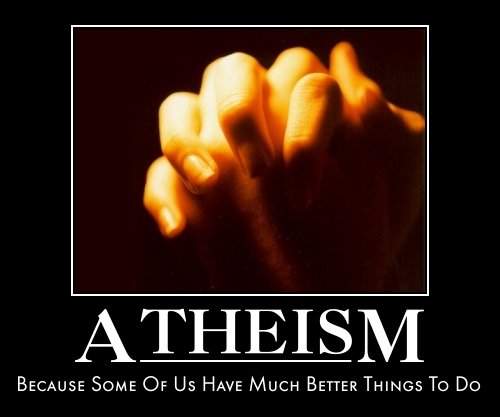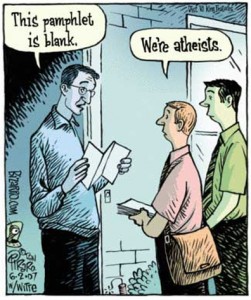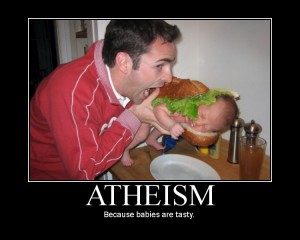R. Joseph Hoffman, a professor at the New England Conservatory and blogger at The New Oxonian has some harsh words for the New Atheists in a recent essay “Atheism’s Little Idea.”
I mention Skepticon because to my mind the meeting is further evidence of the crisis that besets atheism. It cannot quite embrace humanism at the margins, the solution to which for certain ecumenical atheists is to fiddle with the definition of humanism by rolling out the dough ever thinner. It cannot represent skepticism in a methodological way because science and philosophy and even theology have been there and do it. It cannot lay claim to helping people in a direct and positive (as opposed to a merely rhetorical way) because it isn’t, after all, a social welfare movement.
It wants like Pirandello’s lost characters, a cause, an author, something that defines it and sets it apart: science, reason, empathy, concern for human health, but ends up sounding like a nightmare version of a Miss America contestant prompted to give her world peace response.
What atheism and humanism have needed for a long time and once came close to having was a think tank to deal with the theoretical issues of these different movements. It may say worlds about the nature of atheism that this project failed, under the name of secular humanism.
I agree with Hoffman that the resurgent atheist movement has spent a lot more time debunking religion than offering their own philosophical and ethical ideas for the other side to critique. And I agree with Hoffman that this weakness seems to be baked in to the new skepticism. But I don’t think his demands that the atheist movement be other that what it is make much sense.
Expecting a unified atheist or humanist movement to build up interesting philosophical ideas is like expecting libertarians and social conservatives to construct a coherent Republican Party. Having a common enemy might strengthen a coalition, but it doesn’t mean everyone who’s found their way under the big tent will be able to work together when they’re given an opportunity to do something besides resist the foe.

Here are a couple of the things I’ve turned out to majorly disagree with some other atheists about: morality is objective, transhumanism (and gnosticism) are awesome, putting tight constraints on your future self (possibly through covenant marriage) is a pretty good idea. That’s just off the top of my head. As a result, I’d be more likely to heed advice from some Christians than from some intensely relativist atheists.
Atheists do have ideas about philosophy and ethics, but, if you want to talk about them, you need to identify yourself with some other adjective beyond ‘atheist’ or ‘skeptic’ (or ‘humanist’ too, since I’ve never heard the same definition twice for that word). And I’m all in favor of individual atheists putting their cards on the table and giving other people the opportunity to hold their feet to the fire.
But, as a group, we’ve got about as much in common as the members of Mensa or Ravelry, so it makes just as little sense to interrogate us and expect us to contribute en masse as it does to expect a single, coherent moral theory from the knitters of Ravelry. That rules out the purpose that Hoffman expects the New Atheist to fulfill, and I’d like to suggest a different telos.
Atheism does have some pretty significant similarities to the LGBT movement. For many people, outing themselves as an atheist means losing their connection to their families and communities (cf the NYT’‘s recent feature on African-American atheists). An atheist community offers support while people deal with the upheaval, but this doesn’t require a unified moral philosophy. The LGBT movement has plenty of internal divisions about the ideal form of sexual and emotional relationship, but that doesn’t stop groups like PFLAG from doing a lot of good.
The other major role for atheists-as-a-group is as defenders of science education and religious freedom. Hoffman thinks that scientists already have the first goal covered, but it’s a mistake to expect that they’ll do all the heavy-lifting of lobbying. Scientist don’t spend all their time on advocacy because then they wouldn’t have time to be scientists. And plenty of the skills that make someone a good researcher don’t lend themselves to organizing or PR work.
Fighting the anti-science wing of American religious conservatism is a completely different job than just promoting and explaining science. Scientists are used to working in a world where empiricism is a common presupposition and you don’t need to address objections of the type: “radiocarbon dating is a fraud by God to test our faith.” Arguing with these kinds of people is difficult, exhausting, and necessary, since they tend to get elected to school boards and Congress.
I’m glad the new atheist community has organized and funded pro-science and pro-religious freedom advocacy, but I wouldn’t ever expect us-as-a-group to come up with big philosophical ideas. That’s a task for individuals and small, more ideologically similar groups.
The only thing I’d really like to alter is instilling a strong expectation that atheists talk about what they do believe and go to the mats to defend it. This is probably bad strategy, but good philosophy.

















